
Music has always been an essential part of human life, emerging from the rhythms of everyday existence and the sounds that surround us—the hum of cars, the patter of rain, the whispers of the wind, and the crunching of leaves. This natural symphony that transforms chaos into harmony inspires the creation of music as an art form that gives life to life itself while reflecting emotions, history, and culture. Specifically, in the Arab world, music has become their main escape, the language of their soul, and a profound aspect of identity.
Historically, the emotional power of music in the Arab world began in Ugarit, one of the oldest cities in Syria. Found on a clay tablet written in cuneiform—one of the oldest writing systems—along with musical notation and instructions dedicated to the goddess Nikkal, it reflects themes of religion and spirituality. This remarkable piece is known to be a window into the soul of ancient Syria and the Arab world, echoing the values and emotions of its people while emphasizing music as a tool for expressing faith, culture, and identity.
Much like the Palestinian Popular Arts Ensemble, whose work creates songs and melodies not only to express emotions but also to convey messages, in their song “Tarwida Shamali”, for example, they inserted coded messages to secretly communicate with oppressed groups, including prisoners. This showcases music as a powerful tool for unity, resistance, and safety, despite the ongoing struggles for independence.
Similarly, in Lebanon, the legacy of Ziad Rahbani and his mother, Fairouz, highlights music’s cultural impact. Ziad, a gifted composer, blended traditional Arab sounds with modern genres like jazz to address social and political issues, while Fairouz’s mesmerizing voice brought deep emotion to his compositions. Together, they created iconic songs like “The Flower of Cities” in 1970, a beloved anthem of longing and hope, which also reflects the Palestinian struggle and resonates deeply across the Arab world.
Music, whether it’s the captivating voice of Fairouz, the ancient melodies of the Hurrian Hymn, the innovative compositions of Ziad, or the creativity in “Tarwida Shamali”, plays an integral role in expressing through every note and every melody the emotions and stories of the Arab world. It serves as a gentle, yet powerful weapon in a world where war has always been present. It is what people need to survive, and through its beauty and expression, we find the strength to endure, the courage to imagine, and the hope to rebuild.